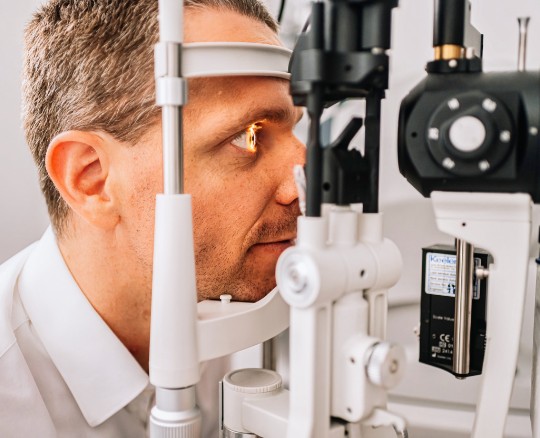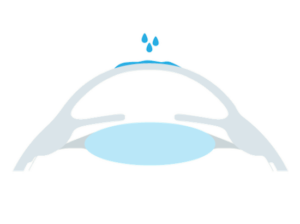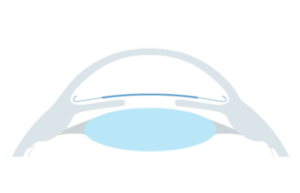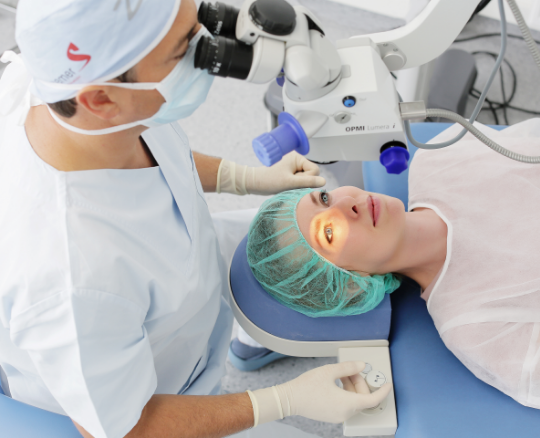Unsuitable for laser eye surgery? Learn how implantable contact lenses enable you to live glasses-free
- Gain independence from glasses and contacts with this ultra-precise vision correction alternative




Gain visual freedom with our Swiss method for exceptional laser eye surgery
Discover everything you need to know about implantable contact lenses below
What does ICL mean?
Even if you have already been told that laser treatment is not possible for you, or you would like to have a reversible procedure to correct your refractive error, you do not have to give up a spectacle-free life.
EyeLaser specializes in the correction of ametropia. We offer both the correction of ametropia using lasers and implantable lenses. EyeLaser is already implanting the latest generation of the EVO + Visian ICL with an even greater optic. This can reduce the risk of so-called halos. As part of an extensive preliminary examination, the surgeon will decide which treatment method is most suitable for you. Due to the excellent image quality, we usually implant the EVO Visian ICL in the following cases:
With the use of Phakic Lenses (ICLs), we can even correct severe visual defects with more than -8 and +3 diopters and astigmatism. In this method, we use a scalpel to make a small tunnel incision in the cornea. Through this tunnel, we insert a foldable artificial lens made of Collamer (ICL) into the eye.
This phakic lens with a certain power corrects the visual defect in the eye. The surgeon inserts the lens between the iris and the natural lens. It is neither visible nor noticeable.
In the first step, the surgeon numbs the eye using eye drops and prepares the lens.
To protect the cornea and lens of the eye, the surgeon injects a protective gel (viscoelastic).
The surgeon implants the lens through a 3.00 mm opening at the edge of the cornea.
Once the surgeon has positioned the lens, they remove the protective gel.
The surgeon will check the fit of the lens during a postoperative check on the day after treatment using special OCT technology.
In some cases, we also combine ICL surgery with a LASIK operation to improve vision further. First, we use an artificial lens to roughly correct the ametropia. After approximately three months, we can perform a LASIK operation. This will fine-tune any astigmatism or residual ametropia.
Patients tolerate the implantation of lenses well and without complication. Inflammation inside the eye can occur in less than 0.1% of cases. The low risks include an increase in intraocular pressure (glaucoma), halos (light effects, for example, when driving a car), glare (night glare) and starlings (fine cloudiness). These can be minimized in advance or eliminated after the operation. Please follow the instructions and the drip plan of the treating surgeon exactly and keep your check-ups.
In some cases, laser eye surgery is not possible or not at low risk, e.g. if the diopter value is too high or the cornea is too thin. In this scenario, the surgeon would need to remove too much tissue, or halos might occur.
For such patients, we also offer refractive lens surgery without a laser. Here we insert an additional artificial lens into the eye or replace the natural lens with an artificial one.
The use and safety of ICL lenses have been scientifically proven in numerous scientific studies. In centres where ICL procedures are routinely performed, complications are rare. Still, you should adhere to the highest safety criteria after every procedure. If you have any doubts, contact the attending physician.
Choose the option below that sounds most like you to discover your best treatment

Millions of people around the world have gained their freedom from glasses and contacts but not everyone’s eyes are suitable for treatment. Book an assessment below and find out if you’re suitable and which treatment can help you best:
BOOK AN ASSESSMENT95.89% to be precise (we’re Swiss. We measure everything). But don’t take our word for it…






We first disinfect your facial area. You will receive a local anaesthetic in the form of eye drops or a syringe next to the eye. Your eyelids are fixed. All this is symptom-free and pain-free.

We use a knife to make a very small and precise tunnel incision at the edge of the cornea.

We insert the foldable phakic lens through the incision.

After the procedure, we will apply a temporary eye patch to protect your eye from environmental factors.

Things like age, eye shape, history and lifestyle make an eye treatment perfect for one person, but not another. Find out which treatment (if any) could free you from glasses and contacts
Take a quizDiscover Austria’s most popular laser eye surgeons in the heart of Vienna and Linz